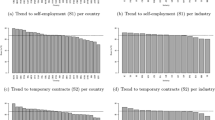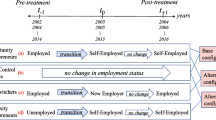Abstract
The ability of young workers to move from dead-end jobs into higher-wage jobs which have better career prospects is greatly influenced by the individual’s characteristics, local labor market conditions, and his or her human capital. This paper examines the characteristics of entry-level jobs of young workers in the 1980s with emphasis on how education and training influence the types of jobs held. The incidence of post-school training is quite low even though all types of post-school training raise wages significantly. Company-provided training reduces the probability that a young worker will leave his or her employer, while off-the-job training increases the ability of employees, especially young women, to move out of a dead-end job.
Similar content being viewed by others
References
Boskin, Michael. “A Conditional Logit Model of Occupational Choice.”Journal of Political Economy 82 (April 1974): 289–98.
Lynch, Lisa M. “The Role of Off-the-Job vs. On-the-Job Training for the Mobility of Women Workers.”American Economic Review 81 (May 1991): 151–56.
_____. “Private-Sector Training and the Earnings of Young Workers.”American Economic Review 82 (March 1992a): 299–312.
_____. “Differential Effects of Post-School Training on Early Career Mobility.” Cambridge, Mass.: National Bureau of Economic Research Working Paper No. 4034, March, 1992b.
_____. ed.Private Sector Training: International Comparisons. Chicago: University of Chicago Press, forthcoming.
Mincer, Jacob.Schooling, Experience, and Earnings. New York: Columbia University Press, 1974.
Schmidt, Peter, and Robert Strauss. “The Prediction of Occupation Using Multiple Logit Models.”International Economic Review 16 (June 1975): 471–86.
Shaw, Kathryn. “A Formation of the Earnings Function Using the Concept of Occupational Investment.”Journal of Human Resources 19 (Summer 1984): 319–40.
_____. “Occupational Change, Employer Change, and the Transferability of Skills.”Southern Economic Journal 53 (January 1987): 702–19.
Author information
Authors and Affiliations
Rights and permissions
About this article
Cite this article
Lynch, L.M. Entry-level jobs: First rung on the employment ladder or economic dead end?. Journal of Labor Research 14, 249–263 (1993). https://doi.org/10.1007/BF02685684
Issue Date:
DOI: https://doi.org/10.1007/BF02685684




